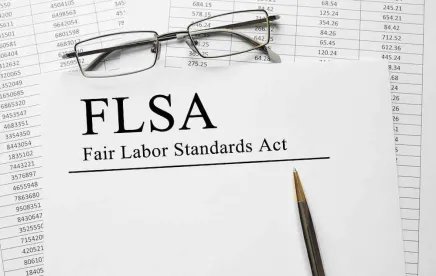On April 27, 2021, the Second Circuit Court of Appeals held in a two to one decision that a plaintiff seeking to recover damages under the Fair Labor Standards Act’s (FLSA’s) extended three-year limitations period for willful violations must do more than make a blanket allegation of “willfulness” to sustain a claim at the initial pleading stage. The case, Whiteside v. Hover-Davis, Inc., Case No. 20-798 (2nd Cir. April 27, 2021), settled a dispute among Second Circuit district courts on the issue, while deepening a circuit split, and is welcome news for employers.
The background facts are straightforward. Plaintiff-appellant Mark Whiteside worked for Hover-Davis as a Quality Engineer, an exempt salaried position. In January 2012, Whiteside’s duties changed, and he began performing the duties of a non-exempt Repair Organization Technician, working between 45 to 50 hours a week. Whiteside’s pay rate was not reduced when his duties changed, nor did he receive overtime compensation. After his employment terminated for economic reasons, Whiteside filed suit alleging various claims, including FLSA violations.
Whiteside alleged in his complaint that Hover-Davis denied him overtime wages to which he was entitled from January 2012 to Jan. 26, 2016. Based on the Jan. 8, 2019, filing date of his complaint, none of Whiteside’s claims were timely under the FLSA’s two-year limitations period. 29 U.S.C. § 255(a). Nonetheless, Whiteside sought to benefit from the extended three-year limitations for willful violations by alleging Hover-Davis’ FLSA violations were “willful.”
Since none of the alleged overtime violations occurred within two years of Whiteside’s filing, and Whiteside pleaded no facts to justify a finding of willfulness, the employer moved to dismiss the FLSA claim as barred by the generally applicable two-year limitations period. The Western District of New York agreed, dismissing the FLSA claims as time-barred. The district court found that Whiteside failed “plausibly” to allege that defendants willfully violated the FLSA. Whiteside appealed, arguing: (1) a plaintiff need not plead specific facts to state a claim for a willful FLSA violation; and (2) even if specific facts must be pleaded, Whiteside pleaded sufficient facts to give rise to an inference of willfulness.
The court analyzed the issue by first recognizing the foundational applicability of the United States Supreme Court’s holdings in Twombly[1] and Iqbal[2] – namely, that “claims must rest on well-pleaded factual allegations.” These seminal cases suggest a two-pronged approach in evaluating claims at the pleadings stage: (i) courts should note that pleadings resting on legal conclusions are not entitled to an “assumption of truth”; and (ii) courts should consider whether the factual allegations, if true, “plausibly give rise to an entitlement of relief.” Iqbal at 679.
The court concluded that requiring FLSA plaintiffs to plausibly plead willfulness conforms with the well-settled “plausibility pleading regime,” and a plaintiff must do more than allege the word “willfulness” to survive a motion to dismiss based on the pleadings. Rather, a plaintiff must plead facts that support a plausible inference of a willful violation.
The court further observed that when the FLSA first passed in 1938, it contained no limitations period. In 1947, Congress established the two-year limitations period under the Portal-to-Portal Act, and in 1965 the secretary of labor proposed extending the period to three years. Congress rejected that proposal, adopting instead a three-year exception for willful violations. The Second Circuit reasoned that in doing so Congress clearly intended to draw a “significant distinction” between ordinary claims warranting the longer three-year period, because the plaintiff claims “the employer knew or showed reckless disregard for the matter of whether its conduct was prohibited by the statute.”
Emphasizing the three-year limitations period as an exception to the general rule, the court instructed it would not allow a patently untimely claim to proceed through the discovery phase based “upon the insertion of a single legal conclusion – indeed, a single word [willfulness] – into a complaint.” Rather, a plaintiff must plead facts that plausibly support a willful violation to obtain the extended limitations period.
Analyzing the complaint in this case, the court found that Whiteside merely alleged his employer required him to perform non-exempt job duties despite his exempt status. There was no allegation Whiteside complained to management about his pay, nor any allegations that his managers possessed any awareness of an impropriety. Although the complaint contained the words “willful violation,” the court concluded such words “at most” give rise to an inference of negligent misclassification, which is not enough to plead a willful violation.
The Second Circuit’s recognition of the “significant distinction” between ordinary and “willful” cases may influence pleading standards and cause a spike in the filing of motions to dismiss, but ultimately it may also help limit exposure in cases as courts turn a more critical eye to evaluating whether overtime violations are truly the result of willful conduct versus mere negligence.
[1]Bell Atlantic Corp. v. Twombly, 550 U.S. 544 (2007).
[2]Ashcroft v. Iqbal, 556 U.S. 662 (2009).




 />i
/>i

